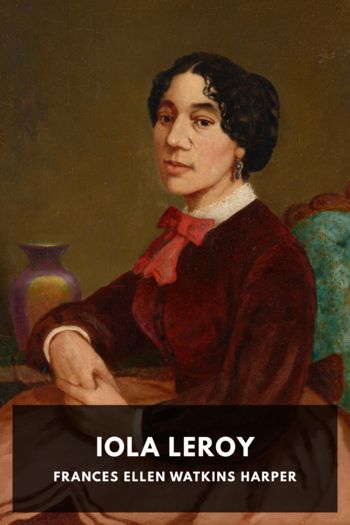Iola Leroy, Frances Ellen Watkins Harper [read aloud books .txt] 📗

- Author: Frances Ellen Watkins Harper
Book online «Iola Leroy, Frances Ellen Watkins Harper [read aloud books .txt] 📗». Author Frances Ellen Watkins Harper
“Surely,” said Bishop Tunster, “the negro has a higher mission than that of aimlessly drifting through life and patiently waiting for death.”
“We may not,” answered Rev. Carmicle, “have the same dash, courage, and aggressiveness of other races, accustomed to struggle, achievement, and dominion, but surely the world needs something better than the results of arrogance, aggressiveness, and indomitable power. For the evils of society there are no solvents as potent as love and justice, and our greatest need is not more wealth and learning, but a religion replete with life and glowing with love. Let this be the impelling force in the race and it cannot fail to rise in the scale of character and condition.”
“And,” said Dr. Latimer, “instead of narrowing our sympathies to mere racial questions, let us broaden them to humanity’s wider issues.”
“Let us,” replied Rev. Carmicle, “pass it along the lines, that to be willfully ignorant is to be shamefully criminal. Let us teach our people not to love pleasure or to fear death, but to learn the true value of life, and to do their part to eliminate the paganism of caste from our holy religion and the lawlessness of savagery from our civilization.”
“How did you enjoy the evening, Marie?” asked Robert, as they walked homeward.
“I was interested and deeply pleased,” answered Marie.
“I,” said Robert, “was thinking of the wonderful changes that have come to us since the war. When I sat in those well-lighted, beautifully-furnished rooms, I was thinking of the meetings we used to have in bygone days. How we used to go by stealth into lonely woods and gloomy swamps, to tell of our hopes and fears, sorrows and trials. I hope that we will have many more of these gatherings. Let us have the next one here.”
“I am sure,” said Marie, “I would gladly welcome such a conference at any time. I think such meetings would be so helpful to our young people.”
XXXI Dawning Affections“Doctor,” said Iola, as they walked home from the conversazione, “I wish I could do something more for our people than I am doing. I taught in the South till failing health compelled me to change my employment. But, now that I am well and strong, I would like to do something of lasting service for the race.”
“Why not,” asked Dr. Latimer, “write a good, strong book which would be helpful to them? I think there is an amount of dormant talent among us, and a large field from which to gather materials for such a book.”
“I would do it, willingly, if I could; but one needs both leisure and money to make a successful book. There is material among us for the broadest comedies and the deepest tragedies, but, besides money and leisure, it needs patience, perseverance, courage, and the hand of an artist to weave it into the literature of the country.”
“Miss Leroy, you have a large and rich experience; you possess a vivid imagination and glowing fancy. Write, out of the fullness of your heart, a book to inspire men and women with a deeper sense of justice and humanity.”
“Doctor,” replied Iola, “I would do it if I could, not for the money it might bring, but for the good it might do. But who believes any good can come out of the black Nazareth?”
“Miss Leroy, out of the race must come its own thinkers and writers. Authors belonging to the white race have written good racial books, for which I am deeply grateful, but it seems to be almost impossible for a white man to put himself completely in our place. No man can feel the iron which enters another man’s soul.”
“Well, Doctor, when I write a book I shall take you for the hero of my story.”
“Why, what have I done,” asked Dr. Latimer, in a surprised tone, “that you should impale me on your pen?”
“You have done nobly,” answered Iola, “in refusing your grandmother’s offer.”
“I only did my duty,” he modestly replied.
“But,” said Iola, “when others are trying to slip out from the race and pass into the white basis, I cannot help admiring one who acts as if he felt that the weaker the race is the closer he would cling to it.”
“My mother,” replied Dr. Latimer, “faithful and true, belongs to that race. Where else should I be? But I know a young lady who could have cast her lot with the favored race, yet chose to take her place with the freed people, as their teacher, friend, and adviser. This young lady was alone in the world. She had been fearfully wronged, and to her stricken heart came a brilliant offer of love, home, and social position. But she bound her heart to the mast of duty, closed her ears to the syren song, and could not be lured from her purpose.”
A





Comments (0)